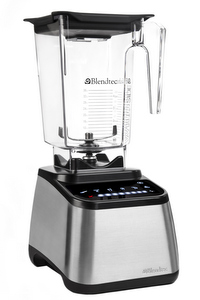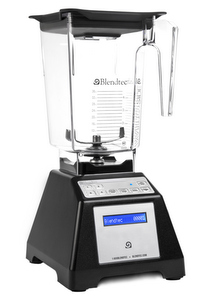Can I Use My Blendtec Blender in Other Countries?

 The Blendtec Designer Series and Total Blender Classic are made for use only in the US and Canada. I have a good friend who purchased a Blendtec Total Blender Classic several months ago. He loves it and wanted to take it with him when he moved to England so that he could continue to enjoy perfectly blended green smoothies, nut butters, and milk shakes. He asked me if he'd have any problems using his blender in England. Unfortunately, like a lot of other appliances, blenders that are built for the US market won’t work in many other countries around the world, including England. This is primarily due to differences in the power transmission systems. Power systems used around the world can be lumped into two broad categories: 120-volt and 240-volt systems. In addition to the different voltages, countries often differ in power frequency (50–60 hertz, this usually doesn't affect our blenders) and the type of plugs needed for the wall socket (there are at least 13 different types of plugs used around the world!).
The Blendtec Designer Series and Total Blender Classic are made for use only in the US and Canada. I have a good friend who purchased a Blendtec Total Blender Classic several months ago. He loves it and wanted to take it with him when he moved to England so that he could continue to enjoy perfectly blended green smoothies, nut butters, and milk shakes. He asked me if he'd have any problems using his blender in England. Unfortunately, like a lot of other appliances, blenders that are built for the US market won’t work in many other countries around the world, including England. This is primarily due to differences in the power transmission systems. Power systems used around the world can be lumped into two broad categories: 120-volt and 240-volt systems. In addition to the different voltages, countries often differ in power frequency (50–60 hertz, this usually doesn't affect our blenders) and the type of plugs needed for the wall socket (there are at least 13 different types of plugs used around the world!).  The Blendtec HP3A is made for use in countries outside the US and Canada.[/caption] The motors that we use in our blenders are designed to operate at specific voltages. So, a blender built for the US market has a motor that operates correctly only when powered with 120 volts. A blender that will be used in England needs a motor that operates correctly at 240 volts, as well as a plug that fits into the electrical outlets in the country. Without replacing the motor and plug, a blender built for the US market will not function correctly in England. And, any changes made to adapt the blender to a different power transmission system will void the warranty. Various devices can convert voltage and electricity currents. For example, transformers can convert 240 volts to 120 volts and power inverters can convert 12-volt direct current (DC) to 120-volt alternating current (AC). Though these devices can be used safely with low-power appliances, the devices usually can't provide the power Blendtec blenders require or the waveforms necessary for our blender electronics to function correctly. We don't recommend using these devices with our blenders; doing so will void the warranty.
The Blendtec HP3A is made for use in countries outside the US and Canada.[/caption] The motors that we use in our blenders are designed to operate at specific voltages. So, a blender built for the US market has a motor that operates correctly only when powered with 120 volts. A blender that will be used in England needs a motor that operates correctly at 240 volts, as well as a plug that fits into the electrical outlets in the country. Without replacing the motor and plug, a blender built for the US market will not function correctly in England. And, any changes made to adapt the blender to a different power transmission system will void the warranty. Various devices can convert voltage and electricity currents. For example, transformers can convert 240 volts to 120 volts and power inverters can convert 12-volt direct current (DC) to 120-volt alternating current (AC). Though these devices can be used safely with low-power appliances, the devices usually can't provide the power Blendtec blenders require or the waveforms necessary for our blender electronics to function correctly. We don't recommend using these devices with our blenders; doing so will void the warranty.  We use ol' Bertha here to provide different voltages as we test various motors.[/caption] So, while my friend’s blender works great in the US, it won’t work for him in England. The good news is that we currently ship blenders to nearly 90 countries worldwide (including England), so he is covered. Wherever you are, we probably have a blender that will work in your location!
We use ol' Bertha here to provide different voltages as we test various motors.[/caption] So, while my friend’s blender works great in the US, it won’t work for him in England. The good news is that we currently ship blenders to nearly 90 countries worldwide (including England), so he is covered. Wherever you are, we probably have a blender that will work in your location!



Hi Stefan,
If you are going to use the blender in Austria, you will need to buy one from Blendtec’s Austrian dealer.
We currently do not have a dealer in Italy, but are working to get one there. You can learn more about international Blendtec blenders here.
I have a question about using a Blendtec we already own in the UK in India. Both countries are on 240v so I imagine it will work without a problem? What about the warranty? Is the warranty an international one when used in a country with the same power requirements? I hope so!
A good, high-quality converter should not affect the performance or speed of the blender. A low cost converter or one that does not produce “clean” power may have an affect on the efficiency of the blender or reduce the total power the blender can produce. We never recommend using a converter with your blender, but if you are going to, be sure it is a high-quality one. And, as you know, using one will void your warranty.
Hi Adam,
Under normal use the starting wattage of our blenders will not exceed 1800 watts, so a 2000 watt converter should be fine. However, it is possible to exceed 1800 watts under extreme use cases, an example would be overfilling the jar, just something to be aware of. Again, as you know, using the converter will void the warranty on your blender.
Leave a comment